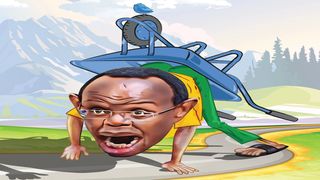
News
Premium
Ndii dumps ‘truth economics’ in graft fight for bottoms-up
What you need to know:
- Dr Ndii has in the past week given a radical perspective of how UDA views the thorny subject of corruption.
- In his days as a columnist, he had excoriated the Jubilee government over its record on corruption.
Economist David Ndii has decided that he will no longer be economical with the truth regarding the state of corruption in the United Democratic Alliance (UDA), a party he is supporting.
A veteran in working with political parties, having first worked with Ford Kenya in the early 1990s on matters of economy, Dr Ndii has in the past week given a radical perspective of how UDA views the thorny subject of corruption. The following quotes are from tweets he has been posting since Wednesday.
“Corruption is not our priority. Those who want to run on it can do so. Our position is combating corruption is mandate of oversight bodies and criminal justice system.”
“There is no hypocrisy in UDA. UDA is the face of Kenya, and Kenya is as corrupt as sin. The first step towards recovery from addiction is acceptance.”
“If you are looking for an anti-corruption platform, don’t support UDA. We are not running on that platform.”
“UDA is not the place to look for anti-corruption champions. Why do so many people seem unable to deal with so obvious a truth?”
Record of corruption
“In UDA, our top priority is #BottomUpEconomicsKE. Meaningless anti-corruption rhetoric and virtue-signalling we have left to Raila and NGOs who are funded for it.”
In career banter, people in Dr Ndii’s profession are defined as such: “An economist is an expert who will know tomorrow why the things he predicted yesterday didn’t happen today.” It is a quote attributed to Canadian educator Lawrence J Peter.
The quote might leave some mist on the spectacles of the Oxford-trained Dr Ndii, especially when he considers the position he held when he was backing the opposite side of Deputy President William Ruto in the last General Election.
Even before that, in his days as a columnist, he had excoriated the Jubilee government over its record on corruption, and in October 2016 he famously skipped an anti-corruption summit at State House.
He would later write about it: “What the public got was a three-ring circus — the thieves, the look-outs and the court jesters — with the President as the main act.”
He further wrote: “That plunder has become a way of life in this country is hard to contest. Known plunderers occupy some of the highest offices in the land, and others whose loot is still hot are lining up to run for office.”
Admission of corruption
The Dr Ndii seen on Twitter this week was a rather resigned man, who went as far as admitting that he is corrupt himself.
“I bribe. I do business with very corrupt people. I am a regular Kenyan,” he said in a tongue-in-cheek tone as he replied to a user who had asked whether he is corrupt. But still, the change of tone could not be missed.
His assertion, which some view as a paradox, is that UDA is more concerned about the bottom-up economic model as opposed to campaigning against corruption or illegalising some people’s “hustles”.
“Dr Ndii asserts that corruption is non-issue to them. Those who want to steal public resources go ahead and do so. UDA offers them a safe haven and a direct ticket to any elective post of their choice. So Kenyans just loot, UDA will protect you,” One Kimani tweeted to Dr Ndii as he sought to interpret one of the economist’s tweets.
Dr Ndii’s response was: “You prefer that I lie to you?”
A one-time radical who founded the Institute of Economic Affairs to put the government on its toes on matters of debt and fiscal policy, today Dr Ndii is a man with a split conscience. Having been on ODM leader Raila Odinga’s corner in 2013 with its anti-corruption rhetoric, he has since switched sides to Dr Ruto’s and his favoured UDA party.
We end with another joke about Dr Ndii’s profession, said by Saurabh Sharma: “Economists and psychologists get confused when they are asked ‘out of syllabus’ questions by life!”





